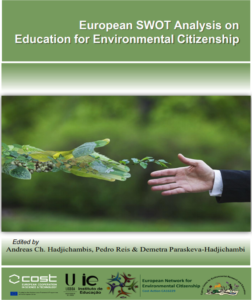Chapter 24: Short Country Report UNITED KINGDOM
Andri Christodoulou & Ralph Levinson
Abstract: Education for Environmental Citizenship is a concept not used or dis-cussed within the formal educational system in England, although some of the competencies, including knowledge, skills, values and attitudes associated with pro-environmental action and behaviours within the private and public sphere of young people are addressed through other means such as Science, Citizenship and Geography Education, as well as through informal cross-curricular learning opportunities. This chapter presents a short review of the Strengths, Weaknesses, Opportunities and Threats (SWOT) of Education for Environmental Citizenship, as this applies in the UK context, based on the views of five UK experts. Key findings include the recognition of Education for Environmental Citizenship as a concept that has the potential to promote young people’s active participation and engagement in decision-making processes about the environment and sustainable development, and to allow them to take action on issues within their communities and social contexts. At the same time, our experts point out to the need to clarify and exemplify the uniqueness of Education for Environmental Citizenship compared to other similar approaches, whilst taking advantage of the existing research and good practices that have been developed for such approaches such as science education, citizenship education and education for sustainable development.

